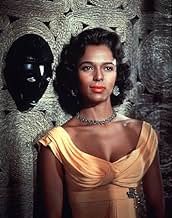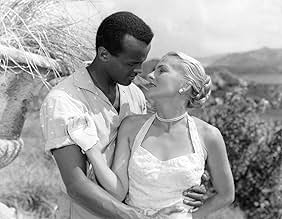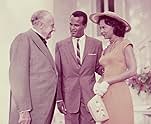VALUTAZIONE IMDb
6,1/10
1499
LA TUA VALUTAZIONE
Aggiungi una trama nella tua linguaThis drama set during the 1950s on a British-ruled Caribbean island deals with local politics, interracial relationships, social inequality, racism, adultery, and murder.This drama set during the 1950s on a British-ruled Caribbean island deals with local politics, interracial relationships, social inequality, racism, adultery, and murder.This drama set during the 1950s on a British-ruled Caribbean island deals with local politics, interracial relationships, social inequality, racism, adultery, and murder.
Jack Armstrong
- Snooker Player at Santa Marta Club
- (non citato nei titoli originali)
Patrick Halpin
- Santa Marta Club Member
- (non citato nei titoli originali)
Victor Harrington
- Snooker Player at Santa Marta Club
- (non citato nei titoli originali)
Recensioni in evidenza
This was a very unique movie for Hollywood in the 1950s because it explored interracial relationships from both a political as well as romantic perspective. No doubt, it made audiences extremely uncomfortable.
The cast is very strong (with Dorothy Dandridge, Joan Fontaine, John Williams and James Mason--who never disappoints,) and the storyline both intriguing and unpredictable. Harry Belafonte portrays a proud, outspoken labor leader who fights racial injustice on a British Caribbean island, but this is only a secondary plot line. The "forbidden fruit" of interracial relationships is explored from several different perspectives giving this movie an important place in the history of American Cinema. Although racism and class-ism are common elements, the characters are empathetically portrayed. This movie was released in Jim Crow America and, younger viewers may not fully appreciate its' unique portrayal of Blacks in non-subservient roles. Blacks were typically cast as inarticulate maids and butlers, but Dorothy Dandridge (nominated as Best Actress for Carmen Jones in 1954) and Harry Belafonte (a top ten pop singer) were particularly stunning and sophisticated, an anomaly for Black actors in films roles at the time. Nevertheless, Belafonte's acting is often stilted, revealing that this was an early role while Dandridge's character lacks depth--though her acting superb, given that she has been given so little with which to work.
An important side note is that Harry Belafonte was a top-selling West Indian Calyso singer (Day-0-The Banana Boat Song) at the time that this movie was released and performed the title song. In addition to making a strong political statement about the need for racial justice--via his character in this film--he also was a high-profile figure within the Civil Rights Movement, marching with the Reverend Doctor Martin Luther King.
The cast is very strong (with Dorothy Dandridge, Joan Fontaine, John Williams and James Mason--who never disappoints,) and the storyline both intriguing and unpredictable. Harry Belafonte portrays a proud, outspoken labor leader who fights racial injustice on a British Caribbean island, but this is only a secondary plot line. The "forbidden fruit" of interracial relationships is explored from several different perspectives giving this movie an important place in the history of American Cinema. Although racism and class-ism are common elements, the characters are empathetically portrayed. This movie was released in Jim Crow America and, younger viewers may not fully appreciate its' unique portrayal of Blacks in non-subservient roles. Blacks were typically cast as inarticulate maids and butlers, but Dorothy Dandridge (nominated as Best Actress for Carmen Jones in 1954) and Harry Belafonte (a top ten pop singer) were particularly stunning and sophisticated, an anomaly for Black actors in films roles at the time. Nevertheless, Belafonte's acting is often stilted, revealing that this was an early role while Dandridge's character lacks depth--though her acting superb, given that she has been given so little with which to work.
An important side note is that Harry Belafonte was a top-selling West Indian Calyso singer (Day-0-The Banana Boat Song) at the time that this movie was released and performed the title song. In addition to making a strong political statement about the need for racial justice--via his character in this film--he also was a high-profile figure within the Civil Rights Movement, marching with the Reverend Doctor Martin Luther King.
While there are many other more "contemporary" films which examine race relations issues equally as competently if not more so - considering this one was produced back in 1957 it should be recognized as genuine breakthrough! Sure, you may have heard about some of its cop outs, but bear in mind that interracial relationships were political dynamite at the time - and yet some of the film's observations remain poignant even today. But the ultimate beauty of this film is that even if you could care less about the racial issues, it still excels as a mystery / "whodunit" with some intriguing plot twists, as a mini musical with Harry Belafonte performing at the top of his game, and even as a sort of Travel Channel feature-of-the-week, which might leave you booking reservations to your own tropical paradise. So tune out the naysayers for a moment and give this one a fair shot. It may not be technically perfect, but most will be entertained, one way or another.
Very easy to imagine this happening throughout the world. The setting of the film (island) creates the microcosm that drives the conflicts of the plot, much like Casablanca. The theme of desire throughout the film helps this wonderful cast create characters you can enjoy and understand, their motives quite transparent. The scene with Harry Belafonte (David Boyeur) singing with the fishermen hauling in the nets stands out. John Williams, who is always brilliant in such roles, works his magic to provoke and entrap James Mason's Maxwell Fleury into confessing his murder. Dorothy Dandridge is lovely as Margot, and the subplot of her love affair keeps the hope for happy endings alive in the film. The cinematography helps to develop the exotic yet isolating setting, and the sets do well to set the tone of the lifestyle (luxurious) of the prominent characters who live under the mercy of desire in the human condition. The themes of this film transcend its setting, and I imagine this film to have been quite enlightening to those who viewed it in 1957. Really enjoyed this film, even in its length.
5tavm
Because this movie was made at a time when there was still a Hays Code and that much of America was segregated, you won't get much passion out of the interracial teamings of either Dorothy Dandridge/John Justin (though there's some close embraces) nor Harry Belafonte/Joan Fontaine (he's too intense, she's too reserved). Also, the romance between Joan Collins and Stephan Boyd isn't much to write about either (though they do share a kiss). Anyway, this is mainly about James Mason's plantation character and his debates with Belafonte's labor leader character, his jealousy of his wife's (Patricia Owens) supposed affair with a counsel diplomat (Michael Rennie), and his and sister Collins' reaction to a family secret revealed from a reporter and confirmed by their parents (Diana Wynyard and Basil Sydney). Along the way, there's an officer (John Williams) cracking a murder case...With what I just mentioned, there should have been some fireworks but-other than some exciting close calls staged by director Robert Rossen-it's mostly dull with droning dialogue provided by Alfred Hayes as adapted from Alec Waugh's novel. Still, there are a couple of good songs written and performed by Belafonte and a nice dance by Dandridge and also a compelling confrontation between Mason and Belafonte at a speech rally. So on that note, Island in the Sun is at the least worth a look. P.S. The DVD has excellent commentary by historian John Stanley.
OK, so it's not a masterpiece but when I saw it listed on Retroplex the other day, I couldn't wait to see it again. Oh, the drama, oh, the intertwined relationships. How fitting that this came out the same year as "Peyton Place", considered the mother of all soap operas. Yes, it had its sappy moments and its overacting; but what a pleasure to see it again. I see it's out on DVD in all its wide-screen glory...i may have to buy this one as a definite "guilty pleasure". An interesting aside is the pairing of Joan Collins and Stephen Boyd (before his outstanding performance as Messala in Ben-Hur) and the information that they were being considered for 1963's "Cleopatra"--she in Liz Taylor's role as Cleopatra, he in Richard Burton's role as Marc Anthony. Could've changed the whole of cinematic history...something to ponder.
Lo sapevi?
- QuizJoan Fontaine received hundreds of hate letters, containing dimes and quarters, which read, "If you're so hard up that you have to work with a nigger..." They were post-marked from various parts of the country, but they seemed to be dictated by one organization, as many of the phrases were identical. Fontaine turned the letters over to the FBI.
- Citazioni
Mavis Norman: Do you care what stupid, prejudiced people think?
David Boyeur: You've never had to fight stupidity or prejudice.
- ConnessioniFeatured in Biography: Darryl F. Zanuck: 20th Century Filmmaker (1995)
I più visti
Accedi per valutare e creare un elenco di titoli salvati per ottenere consigli personalizzati
- How long is Island in the Sun?Powered by Alexa
Dettagli
Botteghino
- Budget
- 2.250.000 USD (previsto)
- Tempo di esecuzione1 ora 59 minuti
- Colore
- Proporzioni
- 2.35 : 1
Contribuisci a questa pagina
Suggerisci una modifica o aggiungi i contenuti mancanti

Divario superiore
By what name was L'isola nel sole (1957) officially released in India in English?
Rispondi




































